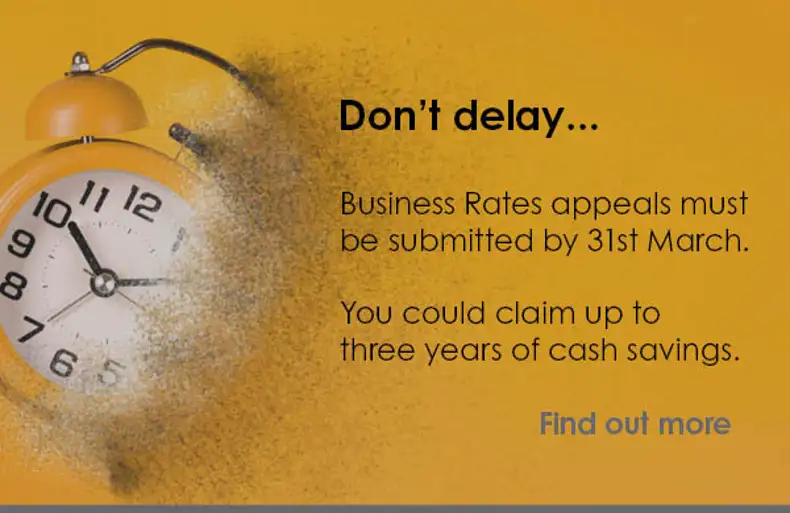Blog | Occupier Business Rates
Why are business rates so unpopular?

Whoever you speak to about business rates, you can be confident of two things. One, they will not like business rates. Two, it will be a passionate dislike.
Whilst few taxes would be described as popular, business rates in particular have been subject to constant criticism.
Why is this - and is there any likelihood it will change?
Level of charge
Above all else, it is the level of the tax that attracts the greatest criticism.
Since 1990 the government has fixed the level of the national Uniform Business Rate (UBR). The UBR has risen from its original level of 34.8p in 1990 to 51.2p this year. This represents an increase in the charge of nearly 50% since it was first introduced.
Annual inflation increases
Regardless of the state of the economy, rates bills are ratcheted up annually by the rate of inflation.
With inflation soaring, this is likely to lead to the UBR for next year incorporating a 9-10% increase due to the level of the CPI.
Empty properties
Before 2008, rates on vacant shops and offices were charged at a 50% discount to the normal level, with no rates at all on vacant warehouse and factories. These reliefs were removed in 2008, and rates are now payable in full after the expiry of a three-month void period on shops and offices and six months on warehouses and factories.
The short void periods offer minimal relief to landlords and fail to reflect the realities of the time necessary to re-let a property. Part of the original justification for abolishing
this relief was that it would encourage landlords to let vacant properties. There is little evidence to support the notion that landlords are dragging their feet, rather than that voids are a result of lack of demand among occupiers.
Even vacant properties in disrepair are normally forced to pay full rates as the legislation requires it to be assumed they are in good repair.
Improvements
If a property is improved, then the government penalises the ratepayer by increasing the rates payable on the building, providing a big disincentive to undertake improvements.
Rates phasing
Following a revaluation, those ratepayers in buoyant markets who have seen large increases in their rateable values are given relief with their rates capped. However, this is balanced by those ratepayers in struggling sectors, who are made to pay the cost of this relief.
This sees the unjust situation of, for example, many retailers in Stockport only seeing a net 3.5% actual reduction in their rates bills in 2017/18, despite their rateable values falling by 50% in that year’s revaluation.
Out of date
This year’s rates bills are based on rental levels prevailing over seven years ago. As property markets are dynamic, the delay in carrying out frequent revaluations leads to a disconnect between the rental value of a property and the rates payable.
Unpredictable
Continual changes to rates make it difficult for businesses to budget ahead. The Government cancelled the 2021 revaluation just 10 months before it was due to come into effect. This was despite the benefits it would have given to the pandemic-hit retail sector. This followed on from the earlier cancellation of the 2015 revaluation. The Government is also only giving 13 weeks advance notice of the new 2023 rateable values before rates bills land on the doormat, giving businesses little time to budget for the new figures. For every previous revaluation, six months’ advance notice was provided.
Transparency
Most taxes are very clear as to the basis of the liability. Business rates charges, however, are based on the rateable value that represents the Valuation Office Agency’s (VOA) estimate as to the 2015 rental value of a property.
The VOA believes the Commissioners for Revenue and Customs Act 2005 prevents it from providing ratepayers with the evidence justifying the valuation rate it has applied and, as result, ratepayers are left unknowing as to whether they are being charged the correct level of tax.
Online Retail
As a proportion of all retail sales, online shopping has risen from 3% in 2006 to 26% in March this year. Many retailers paying high business rates on their high street stores claim rates create an unfair distortion within the retail sector, favouring online retailers that can operate without the need for high value shop units.
Further costs on top
Businesses then face additional costs, piled on top of already high rates bills. These include supplements to finance the cost of proving small business relief, the cost of Business Improvement Districts and, in Greater London, a Crossrail supplement that is due to remain in place until 2041. As just one example of how this really adds up, in Harrow the combined impact of all the supplements can add 11% to the rates bill.
So, what’s next?
The 2023 rating revaluation will update the tax base and partially address some of the current concerns. This is likely to lead to a significant cut in rates bills in the retail sector.
In its recent review of business rates, the government recognised many shortcomings and advised that it “wants to preserve the benefits of business rates but will make changes to make their operation fairer and more effective”.
While the government is proposing making further changes, as well as consulting on others, it is resisting any fundamental cut in the level of the tax.
Although the changes it is making will be largely welcomed, without a cut in the level of the tax it is likely that business rates will continue to attract strong criticism from businesses.
Related Insights

Understanding Your Business Rates Bill: What Landlords and Tenants Need to Know Before March 2026
Act Before April, now is the time to review your position.

2026 Rating Revaluation – draft figures published
The government has now published the draft 2026 Rateable Values which will come into effect on 1st April 2026.

Challenge your current business rates before 31st March 2026
Time is running out to challenge your current business rates – so action is needed now! The last date to submit an appeal to ...

How the 2026 Rating Revaluation Will Impact Your Business Rates and UBR
Update on the upcoming 2026 Rating Revaluation, which will take effect from 1 April 2026.